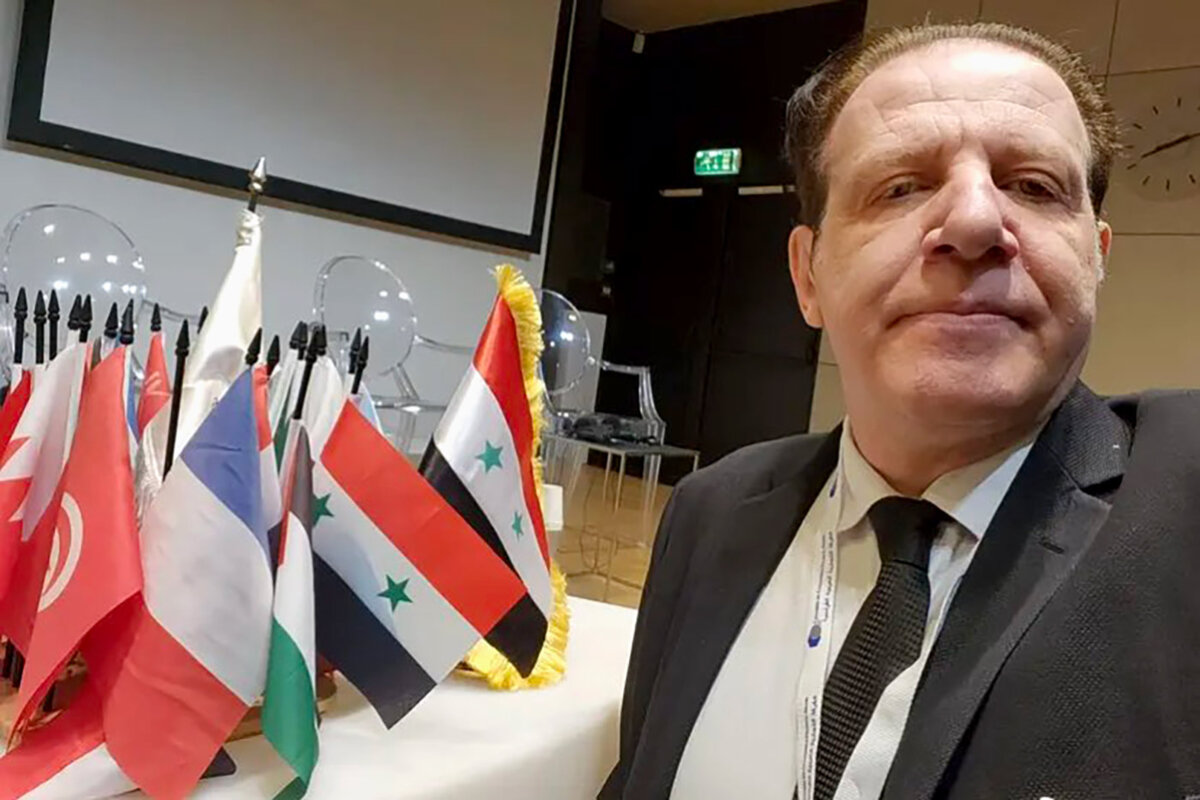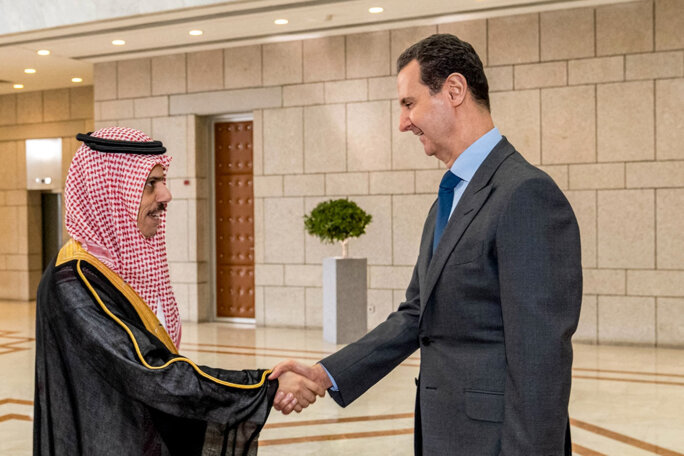It was on March 15th this year, the date marking the 12th anniversary of the early pro-democracy demonstrations in Syria which would, following Bashar al-Assad’s ruthless crackdown on the protests, become a bloody civil war, that Syrian businessman Musan Nahas attended a Franco-Arab economic summit in Paris.
The event was organised by the Paris-based Franco-Arab Chamber of Commerce (the CCFA), and was hosted by the Medef, the largest representative organisation for French businesses, at its headquarters in the centre of the French capital.
Nahas had been invited to the summit by the CCFA in his capacity as representative of the Federation of Syrian Chambers of Commerce. According to the The Syria Report, an outlet specialised in reporting on Syrian economic affairs, it was the first time in 12 years that an envoy from a Syrian business organisation had been hosted in Paris. It said Nahas, a member of the Damascus chamber of commerce, was an official appointee, demonstrating his ties to the Assad regime.
During cocktails on the sidelines of the summit, Nahas took selfies of himself in the company of Medef president Geoffroy Roux de Bézieux and Estelle Brachlianoff, CEO of French utilities group Veolia, which he posted on his Facebook account.
On its French-language service, SANA, the Damascus regime’s news agency, reported on the presence of Nahas at the summit. SANA cited Nahas as saying he had been invited by the “Federation of Arab Chambers” and that this represented “an important and major turning point in the return of Syrian relations with all”.
Roux de Bézieux, questioned about the presence of Nahas during an interview on French public radio station France Inter on April 4th, declared: “Of course not, we didn’t invite him,” adding that he had been the victim of a “manipulation”.

Enlargement : Illustration 1

Questioned by Mediapart, the French foreign affairs ministry described the summit, held under the patronage of President Emmanuel Macron, and in which the ministry’s secretary general, its highest-ranking civil servant, took part, as “a private event”.
According to Nahas, interviewed in April on an official Syrian TV channel, when he underlined the significance of his visit to France, which cut off diplomatic relations with the Damascus regime in 2012, claimed that the CCFA had applied “pressure on the French government for Syria to participate” in its summit.
Interviewed by French weekly Le Journal du dimanche, the CCFA’s honorary president Hervé de Charette, who was French foreign affairs minister from 1995-1997, said he wanted to “look towards the future and to see how to regain contact, both politically and economically” with Syria.
“The statements by Mr de Charrette concern only him alone,” said Philippe Gautier, general director of Medef International. “The Medef strictly adheres to the rules set out by the Ministry of Foreign Affairs, including the international sanctions regime that applies to the Assad regime.” Concerning the presence of Nahas at the Medef’s headquarters, Gautier said the register of representatives of Arab chambers of commerce “were managed exclusively by the CCFA”.
The CCFA, whose board of directors includes representatives of chambers of commerce of states like the United Arab Emirates and Saudi Arabia, which have allowed the Assad regime to rejoin the Arab League, did not respond to Mediapart’s request for comment.
The visit to France by Nahas raises the question of whether the French authorities are turning a blind eye to the initiatives of some circles looking to do business again with Damascus.
Another case in point is that of the French maritime logistics and container transport company CMA CGM, whose French-Lebanese chairman and chief executive, Rodolphe Saadé, enjoys warm relations with the French president. “CMA CGM is the only Western multinational still present in Syria today,” commented Jihad Yazigi, editor-in-chief of The Syria Report.
In 2009, two years before the eruption of the revolution in Syria, CMA CGM, in a 51%-49% joint venture with Syrian company Souria Holding, won a 10-year concession (with an option for a further five years) to manage and operate a container terminal in the principal Syrian port of Latakia. Souria Holding was founded by Asma al-Assad, the wife of the Syrian dictator, and its vice-chairman is Tarif al-Akhras, a leading Syrian businessman and member of her father’s family, who sits on the board of the Federation of Syrian Chambers of Commerce. He is also targeted by European Union (EU) sanctions over his role in supporting the Assad regime.
According to French daily Le Monde, Yasser Ibrahim, the subject of US sanctions and described by former US Secretary of State Mike Pompeo as Assad’s “henchman”, is also believed to have financial interests in the port “alongside the French group CMA CGM”. Ibrahim, a businessman who acts as an economic advisor to Assad and who enjoys close relations with the latter’s wife Asma, is also targeted by EU sanctions, accused of recruiting mercenaries to fight in Libya and Ukraine for the notorious Russian paramilitary group Wagner.

Enlargement : Illustration 2

“The CMA CGM concession reached the end of its term in 2019 and, as amazing as it may seem, CMA CGM then applied to renew the contract,” said Jihad Yazigi. The further five-year deal was revealed in The Syria Report in September 2020.
In a statement given to Mediapart, the Marseille-based container shipping group said it had “put in place a programme of complete compliance to guarantee the respect of regulations relative to the financial and commercial sanctions” concerning Syria, and added that it had in 2019 “bought the shares held by Souria Holding”, making it totally in control of the management of the Latakia container terminal.
The group made no comment on the reported rise, as part of the contract extension, of the Assad regime’s share of profits from the terminal to 65%.
“It is important to understand that a large part of the traffic in Captagon goes through this port,” underlined Yazigi, referring to the amphetamine produced notably in Syria, illicit export sales of which reportedly provides funds for the Damascus regime.
In 2020, shortly after the extension of the Latakia terminal concession contract, CMA CGM signed a partnership agreement, via its foundation (the CMA CGM Foundation), with the French foreign ministry’s “crisis and support centre” (the CDCS) to, in the words of its president, Tanya Saadé Zeenny, “support the management of humanitarian crises abroad”. She said the partnership “prolongs and reinforces the support that the CMA CGM Foundation provides to major NGOs by making available containers, via its programme entitled ‘Containers of Hope’”.
Following the devastating earthquake in Turkey and Syria on February 6th this year, the group announced it had “mobilized the CMA CGM Group’s expertise for a new emergency aid operation” in the quake zone, within the framework of the partnership with the CDCS. However, it would finally decide, in accordance with the CDCS, not to send aid supplies to Syria because of the “absence of sufficient guarantees about the beneficiaries of humanitarian aid”, illustrating the problems in mounting such operations in a country where the regime systematically misappropriates international relief.
“France’s position has not changed,” the French foreign affairs ministry told Mediapart, while refusing to comment on the activities of CMA CGM in Syria. “There cannot be an enduring return of stability in Syria without a political solution that addresses the legitimate aspirations of all Syrians and which allows them to live in peace in their country,” the ministry added.
Ziad Majed teaches Middle East studies and international relations at the American University of Paris, and is the co-author of Dans la tête de Bachar al-Assad (“Inside the mind of Bashar al-Assad”), published in France in 2018 by Actes-Sud. He notes that within the EU, France and Germany hold the firmest positions on opposing normalisation of relations with the Assad regime.
“In 2017 however, Macron demonstrated a form of rupture with [his predecessor as French president, François] Hollande and a will to modify the French approach to Syria, with that well-known comment according to which ‘Bashar is not our enemy, he’s the enemy of the Syrian people’, even if that was not translated politically,” he said. “If the business circles believe that there is once again an opportunity to make money in Syria, then there is little doubt about the fact that they’ll go there. Nevertheless, sanctions and the fear of the actions of Syrian and Russian mafia-like groups limit their margins of manoeuvre – for the moment.”
Meanwhile, clarity is required in the line adopted by the executive. As Mediapart has reported, there were exchanges at the end of last year between French prefecture administrations and the Damascus regime concerning cases of expulsion orders targeting Syrian refugees in France. Furthermore, in February 2022, the publication Intelligence Online reported how Paris was involved, in partnership with the United Arab Emirates, in discretely funding restoration projects at sites in areas under the control of Damascus.
One of these was the “Krac des chevaliers”, a medieval castle emblematic of the Crusades and which Assad, who transformed it into a symbol of victory after retaking it from rebel control in 2014, hopes to develop into a tourist attraction. In 2013, the castle had been placed on a list of endangered world heritage sites by Unesco (which, in December 2020, gave the Damascus regime, via Asma al-Assad’s foundation, a seat on its agency for the protection of “intangible cultural heritage”.
The French foreign affairs ministry said the Krac des chevaliers restoration activities funded by France were carried out at a distance, involving the “digitization of rooms”, and that the restoration of the castle was “a preservation imperative for a site heavily affected by the conflict”.
As for the involvement in the programme of the United Arab Emirates, which promotes a normalisation of relations with Damascus, the ministry said “the positions taken up by our Arab partners concerns a sovereign decision on their part”.
As for the sovereign decisions of France, the French presidential office, the Élysée Palace, did not respond to questions submitted to it by Mediapart on the issues raised in this report.
-------------------------
- The original French version of this report can be found here.
English version by Graham Tearse


